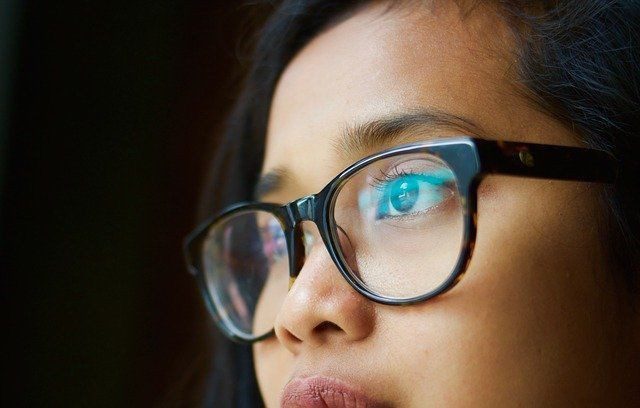Less Blue Light Could Mean More Sleep

During sleep, the body rests while the brain recharges.
But in our digital age, the quality sleep we need can be held hostage by the high-energy emissions coming from computers, phones, tablets and laptops. This lighting, known as blue light, reduces the quality of sleep required for optimal functioning, often making us grouchy, snappy and less productive the next day.
If you put one and one together -- pandemic + increased time spent in front of a screen, the sum is likely lousy sleep. If you are consistenly glued to a computer screen before bedtime -- regardless of reason -- you might have discovered why your normally sweet disposition has soured.
As science would have it, some researchers have found that eyewear with blue-light filtering lenses could restore a good night’s sleep.
Blocking the light
LED lights aren't alone in emitting blue light. All light sources, even fluorescent bulbs emit blue light. This level of emissions throws the human body off its natural internal clock, known as the circadian rhythm. This happens because our brain perceives the presence of bright light indoors as daylight and stops the release of melatonin, a hormone that induces sleep and regulates the body’s 24-hour sleep-wake cycle.
This new study supports one possible solution: wearing glasses that filter out the blue light. The filter stops the short yet high-energy wavelengths from reaching the retina.
In a study published in the Journal of Applied Psychology, researchers at the business schools at Indiana University (IU) and the University of Washington (UW) found that workers who wore these filtered glasses got more sleep and performed better at work.
They conducted two experiments at two US multinational companies based in Brazil. In each group of workers, 63 managers, and 67 customer reps, they spent half the time wearing blue-light filtering glasses, and half the time they wore glasses with fake lenses.
After accumulating data from 519 daily observations in the manager group and 529 in the customer rep group, the researchers learned that blocking that light improved sleep, helped improve attitudes and behavior at work. Those workers who gained the most were those who slept later in the day. The managers reported sleeping 5% longer with the glasses, vs the customer reps' 6%. The quality of sleep also was higher.
When managers wore the glasses, they reported being 8.51% more engaged, while the customer service reps said they were 8.25% more engaged.
“[F]iltering out blue light eliminates much of the suppressing effect of light on melatonin production, allowing the evening increase in melatonin to occur and thereby enabling the process of falling asleep,” said study co-author Christopher M. Barnes, PhD, professor of management at the UW business school, in a news release.
The call center workers also became 17.82% more helpful, which in turn reduced negative work behaviors by 11.76%. The glass-wearing reps also earned a 9% increase in customer ratings.
Call center workers have more to gain by blocking blue light because they often work late and sleep in the daytime. The researchers found that the glasses are more helpful to night owls than early birds.
“Although most of us can benefit from reducing our exposure to blue light, owl employees seem to benefit more because they encounter greater misalignments between their internal clock and the externally controlled work time,” Cristiano L. Guarana, assistant professor at the IU business school, said in the news release.
Although the study shows blue-light filtering glasses may benefit wearers, the findings did not say they were effective for everyone, and did not address computer eyestrain. The glasses may be an inexpensive way to improve your sleep, but if you are experiencing sleep problems, consult your doctor to know the underlying cause.
Not all agree
Some experts question the usefulness of blue-light filtering glasses. Amir Mohsenin, MD, PhD, assistant professor in the Ruiz Department of Ophthalmology and Visual Science at McGovern Medical School in Houston, said he doesn’t believe that they help.
“We don’t really have any data that supports blue-blocking glasses as being better for your eyes when you’re using a computer. In fact, I would say that we don’t know if there’s any potential harm in wearing blue-block glasses. It’s hard to recommend something without knowing more details about it,” Dr. Mohsenin said in a January press release from the Texas Medical Center in Houston. “The reality is that most of the problems we’re having with computers and eyestrain isn’t from blue light; it’s from how we use the computers.”
How blue light interferes with sleep
All kinds of light can interfere with melatonin production, but blue light has the greater impact, according to an article by Harvard Medical School researchers. Researchers compared the influence of blue light and green light of similar brightness on melatonin for 6.5 hours of exposure. Blue light suppressed melatonin for three hours, compared to green light, at 1.5 hours.
Here are some tips to cut exposure to blue light at night:
Use dim red lights at night
Do not look at bright screens two to three hours before you sleep
Use blue-light filtering glasses if you work at night
Install an app on your smartphone that filters blue and green lights
During the day, enjoying sunlight and working with other bright lights is fine. These may improve your alertness and mood. When the sun sets, it’s time to avoid blue lights, to let your body and mind relax.
Published by Medicaldaily.com



























